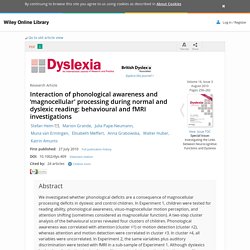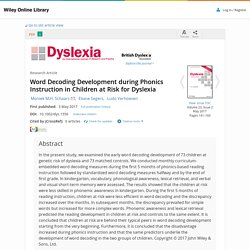

Wiley Online. Are they just lazy? Student teachers' attitudes about dyslexia. Auditory perceptual processing in people with reading and oral language impairments: current issues and recommendations. Auditory stream biasing in children with reading impairments. Can solving of wordchains be explained by phonological skills alone? Cognitive profiles of chinese adolescents with dyslexia. Coping with academic failure, a study of Dutch children with dyslexia. Dichotic listening deficits in children with dyslexia. Dyslexia at a behavioural and a cognitive level. Dyslexic entrepreneurs: the incidence; their coping strategies and their business skills.
Early development of children at familial risk for Dyslexia—follow-up from birth to school age. How dyslexic teenagers cope: an investigation of self-esteem, coping and depression. Interaction of phonological awareness and ‘magnocellular’ processing during normal and dyslexic reading: behavioural and fMRI investigations. We investigated whether phonological deficits are a consequence of magnocellular processing deficits in dyslexic and control children.

In Experiment 1, children were tested for reading ability, phonological awareness, visuo-magnocellular motion perception, and attention shifting (sometimes considered as magnocellular function). A two-step cluster analysis of the behavioural scores revealed four clusters of children. Phonological awareness was correlated with attention (cluster ♯1) or motion detection (cluster ♯2), whereas attention and motion detection were correlated in cluster ♯3. Low-level defective processing of non-verbal sounds in dyslexic children. Non-word repetition and literacy in Dutch children at-risk of dyslexia and children with SLI: results of the follow-up study. On the relationship between dynamic visual and auditory processing and literacy skills; results from a large primary-school study.
Phonological and orthographic spelling in high-functioning adult dyslexics. Predictors of word-level literacy amongst Grade 3 children in five diverse languages. Reading comprehension and reading related abilities in adolescents with reading disabilities and attention-deficit/hyperactivity disorder. The cognitive deficits responsible for developmental dyslexia: Review of evidence for a selective visual attentional disorder. The effects of audiobooks on the psychosocial adjustment of pre-adolescents and adolescents with dyslexia. The sources and manifestations of stress amongst school-aged dyslexics, compared with sibling controls. Unimpaired implicit learning in children with developmental dyslexia.
Word Decoding Development during Phonics Instruction in Children at Risk for Dyslexia - Schaars - 2017 - Dyslexia. In the present study, we examined the early word decoding development of 73 children at genetic risk of dyslexia and 73 matched controls.

We conducted monthly curriculum-embedded word decoding measures during the first 5 months of phonics-based reading instruction followed by standardized word decoding measures halfway and by the end of first grade. In kindergarten, vocabulary, phonological awareness, lexical retrieval, and verbal and visual short-term memory were assessed. The results showed that the children at risk were less skilled in phonemic awareness in kindergarten. During the first 5 months of reading instruction, children at risk were less efficient in word decoding and the discrepancy increased over the months.